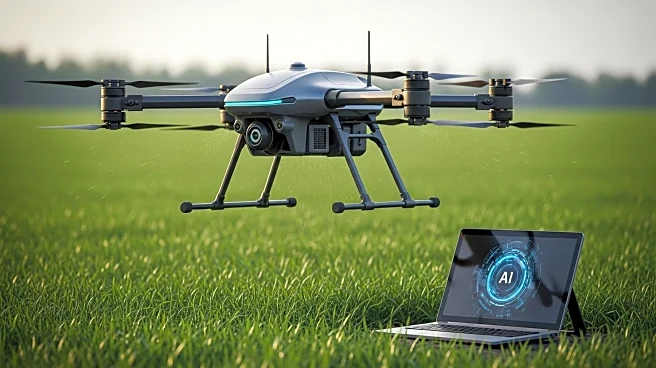What's Happening?
NEXCOM has unveiled the ATC 3561-NA4C, an advanced Edge AI computer specifically designed to enhance agricultural automation. This device is equipped with the NVIDIA Jetson Orin Nano SOM, providing up to 67 TOPS of AI inference performance. It is intended to support autonomous vehicles in various agricultural tasks such as planting, weeding, crop care, and harvesting. The computer features multiple connectivity options, including four GbE PoE ports for IP cameras and LiDAR sensors, CAN bus, RS-232, digital I/O, and OTG interfaces. It also supports GNSS, 5G NR, and Wi-Fi 5/6, enabling real-time AI model updates in the field. The system operates on NEXCOM’s Acceleration Linux with NVIDIA JetPack 6.2 and meets MIL-STD-810H standards for shock, vibration, and temperature tolerance.
Why It's Important?
The introduction of the ATC 3561-NA4C represents a significant advancement in agricultural technology, potentially transforming how farming operations are conducted. By integrating AI capabilities into agricultural machinery, NEXCOM is facilitating more efficient and precise farming practices. This could lead to increased productivity and reduced labor costs, benefiting farmers and the agricultural industry as a whole. The ability to update AI models in real-time ensures that farming equipment can adapt to changing conditions, improving crop yields and sustainability. As agriculture faces challenges such as climate change and resource scarcity, technologies like NEXCOM's Edge AI computer could play a crucial role in addressing these issues.
What's Next?
With the launch of this Edge AI computer, NEXCOM is likely to continue developing and refining technologies that support agricultural automation. The adoption of such systems may prompt other companies to invest in similar innovations, potentially leading to a broader shift towards AI-driven farming solutions. Stakeholders in the agricultural sector, including farmers, equipment manufacturers, and policymakers, may need to consider the implications of increased automation and AI integration. This could involve discussions around regulatory standards, training for workers, and the economic impact of transitioning to more automated farming practices.
Beyond the Headlines
The deployment of AI in agriculture raises important ethical and cultural questions. As machines take on more roles traditionally performed by humans, there may be concerns about job displacement and the need for new skill sets among agricultural workers. Additionally, the reliance on AI and technology in farming could influence cultural practices and traditions associated with agriculture. Long-term, the integration of AI could lead to shifts in how food is produced and consumed, potentially affecting global food security and sustainability.










